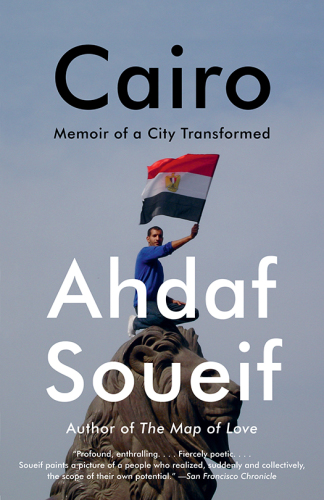
Cairo
Memoir of a City Transformed
- اطلاعات
- نقد و بررسی
- دیدگاه کاربران
نقد و بررسی

July 29, 2013
What novelist and translator Soueif (The Map of Love; Mezzaterra) saw during the Egyptian revolution of 2011 was no less than the upheaval of an entire order of Egyptian society. Hailing from a generation that tried and failed to bring down the Mubarak dictatorship years before, Soueif rushed back to her native city from a literary festival in India on January 25, 2011, after she heard news of unrest erupting in Tahrir Square. She affectionately refers to the now world-famous square as the Midan (from its Arabic name: Midan el-Tahrir) throughout her diary of the decisive first 18 days, which is followed by accounts tracking later events during the year, such as the elections. Her grown children and nephews and nieces raced home, some from abroad, joining activist siblings, friends, aunts, and other relatives. They participated in spontaneous street demonstrations and provided aid to protestors, as well as setting up film and Internet stations. Soueif writes of her tremendous pride in the younger generation, who faced down government thugs, snipers perched on buildings, tanks, and security police. Many received beatings, or were imprisoned (her own nephew, Alaa, was jailed) or, in the case of 843 protesters, killed. The author captures beautifully her anguish at Cairo’s degradation during the years of dictatorship and Mubarak’s calculated sowing of division among the people. Yet with the recent violent eruptions in the country, Soueif’s work as an eloquent witness is a work in progress. Agent: Andrew Wylie, Wylie Agency.

November 15, 2013
A deeply personal, engaged tribute by the far-flung Egyptian novelist and journalist as she returned to witness the revolution in her hometown. When the conflicts broke out in Egypt at the end of January 2011, Cairo-born Soueif (Mezzaterra: Fragments from the Common Ground, 2005, etc.), having made her home largely in London since her marriage to the London critic and author Ian Hamilton (d. 2001), quickly returned to join the protests in Tahrir Square, as did her sons and many of her relatives. Tahrir is the Cairenes' "Holy Grail," Soueif writes, the locus for demonstrations against the government since 1972, when the author took part in protests against Anwar Sadat's oppressive regime. It has taken the next generation, her children's, to prevail, and Soueif declares gallantly: "We follow them and pledge what's left of our lives to their effort." Early on, the author offers an in-the-moment account of the crucial first days of street action, often messy, confused and involving violent clashes with the police, though undertaken by friends, family and strangers alike with heartwarming camaraderie. Then she moves to October 2011 to show how the Supreme Council of the Armed Forces hijacked the revolution without keeping President Hosni Mubarak's decapitated regime from "growing a new head." Soueif then moves back in time to the period of February 1-12. While being jostled in crowds, blinded by tear gas, harassed by the paramilitary thug militias, the dreaded baltagis, the author passionately evokes the spirit of the beloved city where she was born, through neighborhoods and buildings long-suffering and dear to her--e.g., pleading with police to cease torturing prisoners in the iconic Egyptian Museum. Soueif offers both an extraordinary eyewitness document and a sense of the historical import of the revolution.
COPYRIGHT(2013) Kirkus Reviews, ALL RIGHTS RESERVED.

November 15, 2013
Soueif, author of the best-selling The Map of Love, provides a timely updated edition of her 2012 memoir, Cairo, My City, Our Revolution. Though the bulk of her eyewitness recollections understandably focus on the 18-day revolution that rocked Cairo in 2011, she also interweaves affectionate and peaceful memories of Cairo, Egypt, and her family into the fiery narrative. As an active participant and a keenly observant chronicler of the impassioned rebellion, her firsthand account offers insight into the heady days of the original revolution and its tumultuous aftermath. As Egyptian citizens continue to live the revolution, she provides a uniquely personal perspective on both the events of 2011 and the ensuing years. Contemporaneous food for thought in light of the current turmoil in the Middle East.(Reprinted with permission of Booklist, copyright 2013, American Library Association.)

August 1, 2013
Published in the UK in January 2012, this work concerns not only the upheaval in Cairo that led to the fall of the Mubarak regime but the city itself, recalled here as the heart and soul of her family. It was originally scheduled for publication here in April 2013 but was delayed so that Booker-short-listed novelist could update the UK edition to include commentary on events following the election of Muhammad Morsi as Egypt's president, though she won't be able to add anything about Morsi's fall.
Copyright 2013 Library Journal, LLC Used with permission.




دیدگاه کاربران